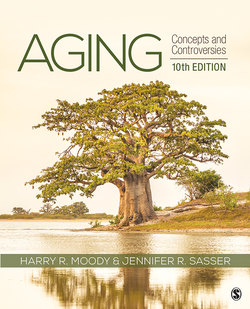Читать книгу Aging - Harry R. Moody - Страница 28
На сайте Литреса книга снята с продажи.
The Moral Economy of the Life Course
ОглавлениеThe changing structure of the life course has profound implications for obligations and expectations across the life course. We can speak about these expectations in terms of the “moral economy” of the life course (Minkler & Estes, 1998). The moral economy embodies expectations of what is fair or right: Stay in school and you’ll get a good job, become a senior citizen and you’ll have a right to retirement income, and so on. In other words, the assumption is that moving through the life course means following the rules and getting what you deserve. But the old moral economy, with its characteristic distribution of work and leisure according to chronological age, is losing its power, and we do not have anything as well defined to replace it.
To overcome limitations of the old map of life, we may need to develop bolder ideas about the positive social contributions that can be made by the old; we also need to think more deeply about the meaning of life’s final stage. Cicero (106–43 BCE), author of the classic essay “On Old Age,” offered a realistic account of both the gains and the losses of aging. Cicero was inspired by the hope that the mind can prevail over the body. Thus, he viewed old age not exclusively as a time of decline or loss but also as an opportunity for cultivating compensatory wisdom. Cicero, in fact, was one of the first and most eloquent proponents of the ideal of “successful aging” (Baltes & Baltes, 1990).
Despite Cicero’s wise words about later life, we should not sentimentalize the status of old age in the past. But at least in the past, those who had lived a full lifespan could take for granted shared values and shared experience across the generations simply because the pace of change was slower. With the rapid social changes of the 21st century, we can too easily stereotype those who are older as people who are “behind the times.”
One role well suited to older people in such an environment might be mentoring, or guiding the next generation in the capacity of teacher, coach, or counselor (Neikrug, 2000). This idea is attractive for several reasons: It encourages intergenerational relationships, and it takes advantage of generativity and wisdom, the virtues to be cultivated in the second half of life, according to Erikson. Older adults who are serving as mentors, however, still have to develop up-to-date skills and attitudes if their advice is to be respected by younger workers.
There appears to be a mismatch between the flexibility of the individual aging experience and the rigidity of outdated social attitudes, such as age discrimination and retirement practices (Riley & Riley, 1994). Instead of treating the life course as fixed, in the future we may come to see later life as a period more susceptible to intervention and improvement. Instead of viewing aging only as decline, it is possible to create a new model of aging as a shared lifelong process and of later life as a period of new opportunities. The goal would be to move from an age-differentiated society to an age-integrated society, where opportunities in education, work, and leisure are open to people of every age and across the entire life course.
